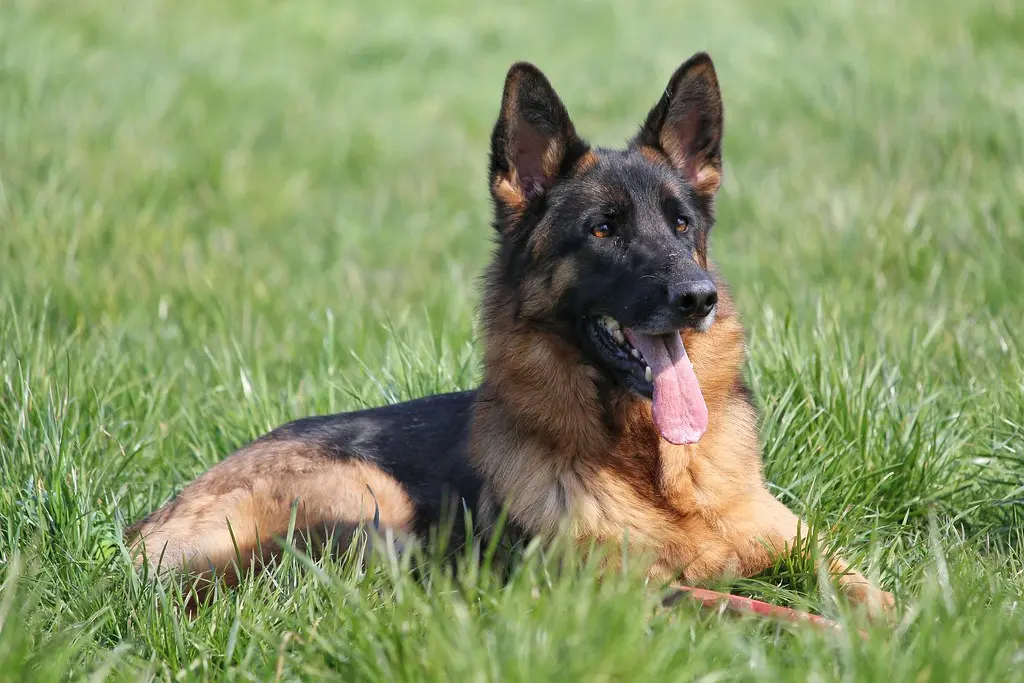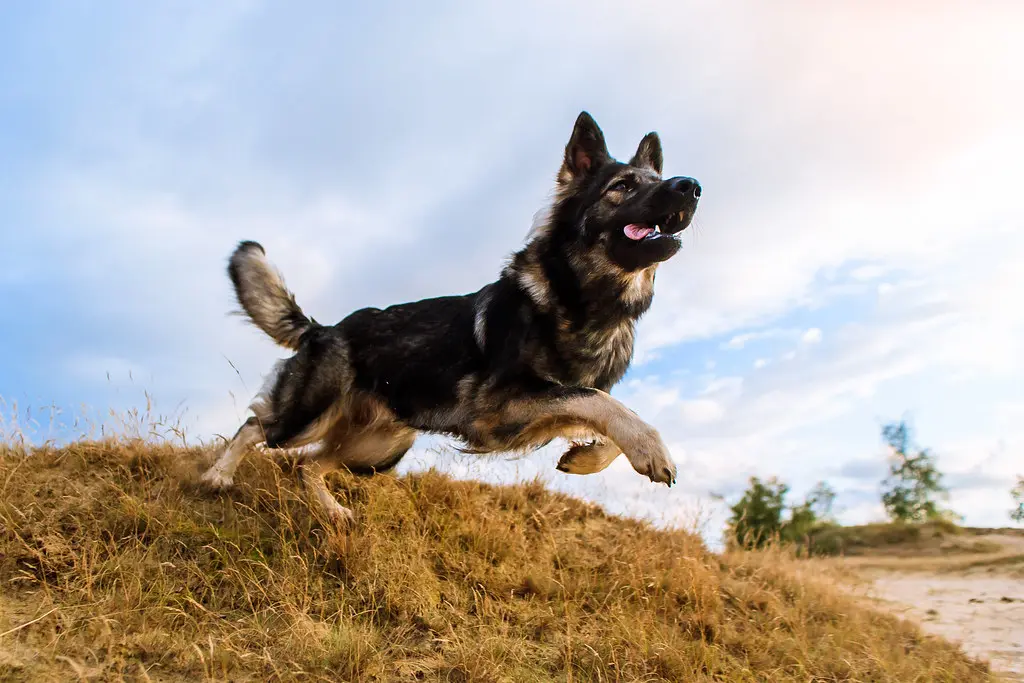Known for their intelligence, agility, and protective instincts, these incredible canines are one of the most popular dog breeds for a reason. Whether you’re a current German Shepherd owner, a future one, or simply have a deep admiration for the breed, this care sheet will help you navigate the journey with your canine.
Let’s get started, shall we?
 German Shepherds At A Glance
German Shepherds At A Glance
Family: Canidae
Class: Mammalia
Length: 22 to 24 inches (Male) and 20 to 22 inches (Female)
Lifespan: Average of 10 years, can live up to 12 years
Weight: 65-75 pounds (Male) and 55-65 pounds (Female)
Energy Level: Average
Intelligence Level: Very High
The German Shepherd: Introduction & History

The German Shepherd is a breed known for its versatility and intelligence. Hailing from Germany, this canine is the epitome of a working dog, performing numerous tasks throughout its history with both skill and devotion.
Tracing the roots of this remarkable breed, we find ourselves in Germany, in the late 1800s. The German Shepherd’s main purpose was to herd sheep and protect them from predators. The breed was carefully crafted by crossing various herding dogs to emphasize the traits required for efficient herding and guarding. With its diligent work ethic, the German Shepherd soon found its way into other roles, such as police and military work.
Physical Characteristics

The German Shepherd is a large, muscular dog with an athletic and agile build. Let’s examine their most notable features:
- Size: The average male German Shepherd stands about 24 to 26 inches tall, while females typically measure 22 to 24 inches. Weight can vary from 50 to 90 pounds, with males being heavier than females.
- Appearance: This breed is easily recognized by its strong head, long snout, and erect ears. They have a slightly sloping topline and a bushy tail, which is often carried low.
- Coat: German Shepherds have a double coat, with a dense, straight outer layer and a soft, thick undercoat. Their coats come in various colors, such as black and tan, sable, and solid black or white.
Behavior and Temperament

The German Shepherd is known for its intelligence and loyalty, which makes them ideal companions and working partners. Here’s a closer look at their temperament:
- Intelligence: Their ability to learn quickly and understand complex tasks is one of their most striking qualities. This makes them suitable for various roles, such as search-and-rescue, police work, and therapy dogs.
- Loyalty: German Shepherds are known to form strong bonds with their families. This loyalty also makes them excellent protectors of their home and loved ones.
- Social: While they can be aloof with strangers, they are generally friendly and sociable with those they know well. Early socialization is crucial in avoiding undesirable behaviors, such as aggression or fearfulness.
The German Shepherd as a Working Dog
As one of the most versatile breeds, the German Shepherd excels in numerous roles, including:
- Police Work: Their keen sense of smell, intelligence, and boldness make them well-suited for tasks such as tracking and apprehending criminals, as well as handling narcotics and explosive detection.
- Search and Rescue: German Shepherds have the stamina, athletic ability, and problem-solving skills needed to locate missing persons in various environments, such as forests, mountains, and even urban areas.
- Assistance and Service Work: With their ability to learn quickly and adapt to various situations, they make excellent guide dogs for the visually impaired and support dogs for individuals with mobility issues or medical needs.
Health Issues

Like all breeds, German Shepherds are prone to certain health problems. It is important for owners to be aware of these conditions and take proactive measures to ensure the well-being of their beloved pets. Here are some of the most common health issues that German Shepherds may face:
- Hip Dysplasia: This is a hereditary condition where the hip joint doesn’t develop properly. It can lead to discomfort, lameness, and arthritis. Regular exercise, a balanced diet, and maintaining a healthy weight can help manage this condition.
- Elbow Dysplasia: Similar to hip dysplasia, elbow dysplasia is a developmental condition affecting the elbow joint. It can cause pain, lameness, and difficulty in movement. Proper nutrition, controlled exercise, and regular veterinary check-ups are important for managing this condition.
- Bloat: Also known as gastric dilatation-volvulus (GDV), bloat is a life-threatening condition that affects deep-chested breeds like German Shepherds. It involves the stomach twisting, which can lead to a blockage of blood flow and potential organ damage. Immediate veterinary attention is crucial if bloat is suspected.
- Degenerative Myelopathy: This is a progressive neurological disease that affects the spinal cord. It typically begins with hind limb weakness and can eventually lead to paralysis. While there is no cure for degenerative myelopathy, supportive care and management can help improve the quality of life for affected dogs.
- Allergies: German Shepherds can be prone to allergies, including food allergies, environmental allergies (such as pollen or dust mites), and contact allergies (such as certain grooming products). Signs of allergies may include itching, skin irritation, and digestive issues. Identifying and avoiding allergens, as well as working closely with a veterinarian, can help manage these allergies.
It’s worth noting that not all German Shepherds will develop these health issues, and responsible breeding practices can help reduce the risk. Regular vet check-ups, a balanced diet, exercise, and an overall healthy lifestyle will keep your German Shepherds in tip-top shape.
Training and Socialization

To fully enjoy the companionship of a well-behaved German Shepherd, early training and socialization are essential. As an intelligent breed, they respond best to positive reinforcement techniques such as clicker training and reward-based methods. Socialization, exposing them to new environments and people from a young age, helps develop a confident and well-rounded dog.
Training a German Shepherd: Key Areas
Training should focus on obedience, control, and social lessons. Here are some main areas:
- Basic Command Training: Essential commands such as ‘sit’, ‘stay’, ‘come’, and ‘heel’ are imperative for controlling your German Shepherd and ensuring their safety.
- Leash Training: German Shepherds’ herding instinct can lead them to pull on the leash. Training them to walk properly on a leash is crucial for respectful and safe walks.
- House Training: Teaching your German Shepherd to be respectful in the home can prevent destructive behavior.
- Behavioral Training: Addressing issues like unnecessary barking, chewing, and aggression is crucial in raising a well-behaved German Shepherd.
Socializing Your German Shepherd
Socialization involves exposing your German Shepherd to different environments, animals, and people. As German Shepherds can be wary of strangers, early socialization is essential for building a calm and confident dog. Experience with various situations can reduce fear and uncertainty, helping your German Shepherd react appropriately when faced with new scenarios.
More Tips
Here are some tips for effective training and socialization:
- Start Early: The earlier you start training and socializing your German Shepherd, the easier it will be.
- Consistency is Key: Keep commands and training routines consistent to avoid creating confusion.
- Use Positive Reinforcement: Positive reinforcement, like treats, playtime, or praise, can make training more effective.
- Patience is Vital: Training takes time and progress may sometimes be slow. Patience and perseverance are essential.
Caring for Your German Shepherd
As with any dog breed, owning a German Shepherd comes with a responsibility that should not be taken lightly. This hard-working and intelligent breed requires an attentive caretaker, dedicated to meeting all of its unique needs.
Nutrition, Diet, and Feeding
German Shepherds are large, active dogs and their dietary requirements reflect this. A diet high in quality animal protein is necessary to support their lean muscle mass. Generally, a German Shepherd will do well on a diet consisting of quality dry or canned dog food, balanced out with some raw or cooked meats and vegetables.
- Feeding Schedule: Adult German Shepherds typically do well on two meals per day, while puppies require smaller, more frequent meals 3 to 4 times daily.
- Treats & Snacks: Treats can be an important aid in training, but also contribute to obesity. Therefore, moderation is the key. Go for healthy options like carrot sticks and other dog-safe veggies.
- Beware of Bloat: Due to their deep chests, German Shepherds are at a higher risk for Bloat or Gastric Dilatation-Volvulus (GDV). Feeding smaller meals, spreading out meals, and discouraging rapid eating and strenuous exercise around meal times can help minimize this risk.
Regular Exercise and Mental Stimulation
German Shepherds require lots of physical and mental exercise each day to stay healthy and happy. Not only can regular exercise help prevent obesity and other health problems, but it can also prevent destructive behaviors caused by boredom or anxiety.
- Physical Exercise: Activities such as walking, swimming, or playing fetch can provide the necessary exercise for your German Shepherd.
- Mental Stimulation: Beyond physical exercise, German Shepherds, being very intelligent dogs, also need mental stimulation. This could come in the form of training sessions, interactive toys, puzzle feeders, or even dog sports such as agility or scent work.
Grooming and Hygiene
German Shepherds have a double coat, consisting of a dense, insulating undercoat and a harder, protective outer coat. Regular grooming helps to ensure the skin stays healthy and the coat remains free of mats.
- Brushing: Expect to brush your German Shepherd’s coat at least 2-3 times a week and daily during the shedding season.
- Bathing: Bath times can be kept to a minimum, every 4-6 months or so, as German Shepherds don’t typically have a strong odor. Extra baths may be necessary if your dog gets particularly dirty.
- Dental Care: Maintaining good dental hygiene is vital. Teeth should be cleaned regularly, ideally daily, with dog toothpaste to help prevent plaque buildup and tooth decay.
- Nail Clipping: Regular nail clippings every 3-4 weeks can prevent overgrowths.
Health Care and Regular Vet Checks
Regular vet check-ups can help detect health problems early, thereby increasing the chances of successful treatment and recovery.
- Vaccinations: Your German Shepherd should have all the necessary vaccines, including Parvovirus, Distemper, and Rabies, among others.
- Parasite Control: Regular use of heartworm, flea, and tick preventatives is a must, especially in certain geographic locations during high-risk times of year.
- Routine Vet Checks: A healthy German Shepherd should be seen by a vet for a regular overhaul at least once a year. Older dogs or dogs with existing health conditions may need to be seen more frequently.
Caring for your German Shepherd requires a significant commitment, but the rewards of sharing your life with a healthy, happy, and well-behaved dog are well worth the effort. By providing good nutrition, regular exercise, proper grooming, and veterinary care, you ensure your four-legged companion stays with you for many years.
Conclusion
The magnificent German Shepherd is a fascinating breed whose intelligence, loyalty, and work ethic make them ideal companions and partners in various roles. With proper care, socialization, and training, they can become beloved members of the family who provide years of devotion and love.
